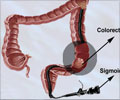The demand for making improvements in the quality and measurement of health care outcomes has been increasing since the publication of a report titled To Err is Human.

In a new paper published online by the Annals of Surgery, physician-researchers at University Hospitals Case Medical Center describe a new tool called the HARM score that reliably measures quality and clinical outcomes for colon and rectal surgery patients. The name of the tool reflects the data sources used to calculate the score: HospitAl stay, Readmission rate, and Mortality. The paper demonstrates a strong correlation between the HARM score, and the quality of clinical outcomes achieved by surgeons and hospitals for patients having major abdominal surgery.
"There is a need for a metric that accurately and inexpensively measures patient outcomes, effectiveness, and efficiency of care," said Conor P. Delaney, MD PhD, senior author of the study and Chief of the Division of Colorectal Surgery at University Hospitals Case Medical Center and Professor of Surgery at Case Western Reserve University School of Medicine.
"The HARM score is easy to measure, derived from routinely captured data elements, applicable to a variety of procedures, and serves as an impetus for continuous improvement," he said.
Previous work they published in the Journal of the American Medical Association in 2010 had demonstrated that the most utilized process measures had no relationship to outcomes. Dr. Delaney said that extensive research and long-term assessment and refinement that his group has now done on enhanced recovery in colorectal surgery led them to conclude that the most important measurements of quality are outcome measures, including length-of-stay (LOS), readmission rates, and mortality.
LOS has gained increasing attention as an indicator of surgical efficiency because consistent and safe reduction of this measure is usually the result of an effective, enhanced recovery program, said Dr. Delaney. LOS is an excellent surrogate marker for complication rates and increased healthcare use, making it a target for cost containment, too, he said.
Advertisement
Dr. Delaney and his team tested the validity of the HARM score by doing a retrospective review of 81,600 colectomy discharge records from 324 hospitals between January 2010 and January 2011found in a national database. They evaluated complications, such as infection following surgery, bleeding, and several other categories. An analysis showed the complication rate directly correlated with the HARM score.
Advertisement
Dr. Delaney said that future studies on the HARM score will include applying it in clinical practice as well as comparisons to national inpatient data samples, and correlating the outcomes against other measures of quality to increase the validity of the score. The researchers conclude that the HARM score is a valid and reliable quality measurement for colon and rectal surgery patient outcomes which has significant implications for benchmarking quality of care.
Source-Eurekalert








